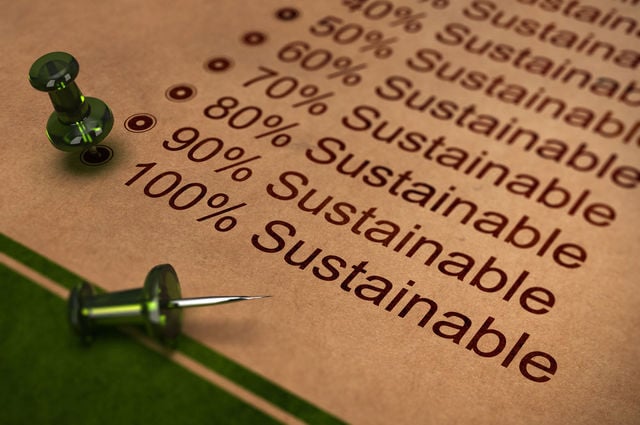How can sustainability be communicated beyond clichés and greenwashing?
31 experts shared their view
Both clichés and greenwashing are amongst the biggest traps to fall into when communicating sustainability. A "let's save the world" claim and tacky towel policy stickers are superficial and unappealing and could be a turn-off to the small group of environmentally and socially-conscious consumers. Green certification and lengthy, detailed corporate sustainability reports may (potentially) be of interest to a small niche group of highly activist consumers, who may not buy into that type of corporate hospitality in any case. However, there is a growing number of informed travelers: Those in search of genuine wellbeing and meaningful experiences at no (or as little as possible) cost to the planet. What works and what doesn't work in communicating sustainability? Any recommendations in regard to communication entering this critical decade?
Interest in business has moved beyond just how companies make more money or become more successful. Factors such as sustainability, corporate culture, social impact, and strong leadership are front of mind and expectations are changing, too. Media attention on such issues has never been stronger and the rise of social activism has led to consumers driving change, calling things out, demanding better. Sustainable investment – once niche to a small group of funds – is now mainstream with investors who increasingly use ESG factors to determine risk and opportunities. Colleague pride is also directly linked to what a business stands for.
There's no doubt that our industry is doing more in all of these areas – collaborating, pledging, committing. But the fact of the matter remains that running a successful business of scale does not always make it straight-forward to make big-ticket changes, such as going waste-free, or switching to renewable energy. This doesn't stop it from being our responsibility, but it is the authenticity of action in these areas and the transparency in how you're progressing which allows those efforts to resonate.
Whether it's your geographical distribution, your business model, or market-related sensitivities, many of the challenges our industry faces stem from the complexity of thinking at scale and the nuances that come with it. For example, IHG's 2019 commitment to remove miniature toiletries from nearly 865,000 hotel bathrooms in favour of large amenities requires a two-year implementation period because it entails partnership and investment from our third-party hotel owners in more than 100 countries, careful research into safety practices and quality standards, and a supportive operational plan for our thousands of hotels to make the change. We find that our stakeholders are willing to understand this, as long as we're transparent about where we are on the journey, the challenges we face and what this means in reality. It's important that any action you take is communicated within your business context and as part of an ongoing journey.
I also believe that robust measurement and data insights are essential to managing operational impact and telling a story of progress. Using the right software to measure and report on the impact of core hotel operations in the areas of energy, carbon, water and waste gives you a chance to set a baseline understanding of overall environmental impact and establish the most effective solutions. This then inevitably enables you to communicate in honest, informed terms – being pragmatic in the areas you need to do more and shouting about your big achievements which are backed up by robust data and learnings.
Consumers – both B2C and B2B – are becoming increasingly conscious of sustainability in their travel decision-making. According to research, 70% of global travellers say they would be more likely to book accommodation knowing it was eco-friendly – whether they were looking for a sustainable stay or not (Booking.com). The same research shows that the intention to stay in at least one eco-friendly accommodation has increased year-on-year over the past four years. This is also being seen in the corporate sector. For example, 53% of North American companies have corporate sustainability programs that affect their decision to contract with a travel supplier (GBTA).
We can see there is an increasing importance for the hospitality industry to communicate their sustainability practices. So how can sustainability be better, and more consistently, communicated?
There is perhaps a nervousness from some areas of the market that talks about sustainability would suggest a compromise on guest experience. One reason for this is that the traditional sustainability communications have tended to put the onus on the guest – e.g. re-use your towels, refrain from having your room cleaned – and a cynical client could perceive this as the hotel trying to save money rather than trying to save the world.
Some of the best sustainability solutions are the ones that are unnoticeable to the guests. We see many examples from our members, and the wider industry, such as grey-water re-use, switching to renewable electricity or employing people from disadvantaged backgrounds, which guests may not be aware of. We, therefore, we need to talk about it so consumers know that it's more than just towels – whether that's on your website, social media channels, or looking for opportunities to communicate to guests during their stay. One way that enhances the guest experience is through story-telling – sharing the information through a personal story, or unique angle will help guests to connect with the story emotionally and provide an opportunity to embed your brand's wider sustainability values in the message.
There is also a lack of a clear definition of what is meant by 'sustainability'. Covering everything from carbon emissions, plastic use, water consumption, and food waste, to providing decent work and supporting the local community, it can be difficult for consumers to compare genuine intent to 'greenwashed' statements.
More consistent definitions and benchmarking across the industry are therefore required. For example, we offer free hotel carbon measurement and hotel water measurement tools to enable every hotel to monitor and report their usage. Greater uptake by the industry of shared resources will ensure a fair system for industry benchmarking as well as helping consumers to determine meaningful actions.
Many of the larger brands now publish annual sustainability or corporate social responsibility (CSR) reports. If this became more common practice (even a short annual summary for smaller hospitality businesses), customers and corporate clients would know to look for this information when assessing their travel options.
In other industries, such as food and cosmetics, consumers are now very accustomed to looking for marques of sustainability such as organic, local or ethical sourcing. So the industry could also make more prominent use of their certifications and membership of industry bodies aimed at improving sustainability (such as International Tourism Partnership) as a way of communicating their sustainability.
With increased sharing of good practice, clearer benchmarking and access to information, we can demonstrate that sustainability provides a genuine value-add and will be a key differentiating factor in every booking selection.
The time for lip-service is long past. It amazes younger generations, to see the lethargy which exists, across the industries as a whole. Leadership is about courage and stewardship, making difficult choices, and convince constituencies that stakeholder value is more important than shareholder value alone. John Kotter's book "Leading Change" and his 8-step model was written many years ago, but is still very current:
step 1: create urgency; and so on... Seemingly, a large group of people who could make a difference do not have this urgency; they still fail to see, do not understand and hence, aren't be able to change thinking or behavior. I am convinced that this is an important reason why we still see many cliches and green-washing. In this week's WEF in Davos, it is very good to see and acknowledge, that climate change is the agenda. Schwab himself underpinned it by stating that stakeholder capitalism must deliver on its environmental obligations and responsibilities.
No time to waste: each person, each small business, each corporate and every conglomerate must take a first step; today! Then we'll still have a fighting chance to avoid climate critical tipping points so that the younger generations have a chance to enjoy this wonderful earth.
Consumers are understandably skeptical when companies claim to be green. To break through the clutter of cliches and empty communique, companies should adopt three messaging strategies:
- Talk hard numbers: Hotels that regularly benchmark their energy use can share their energy, emissions, and improvement metrics with their customers. A statement like, “With your help, we've reduced this hotel's annual energy use by 7% since 2017,” is hard to ignore.
- Involve them in your efforts: Not only should you include specific information about what you're doing (e.g. “We added occupancy sensors to all guest rooms, which should help cut our emissions by 15 metric tons.”), you should also give them specific tasks (e.g. “But we need your help to make sure that the table lamps are turned off before you leave.”)
- Lay on the peer pressure: Scientists call it “social norming,” and it works. For example, alerting guests that “9 out of 10 business travelers who stay at this hotel signed a pledge to turn off the table lamps when they leave their room,” will make them take your efforts more seriously.
Whereas clichéing communicator misses the chance to present the manifold added values of sustainability, greenwashers pretend that they have made efforts, however just for the sake of being perceived as green and thus trustable and a brand to stick with. The former falls into the green cliché communication trap. Examples of this are imagery that shows hands holding a globe, copy talking about Mother Earth and Planet B, an inflationary use of the color green and leaves as an illustrative style element. The latter – the greenwasher – celebrates his plastic straw ban as if he just got an award for environmental protection. Press releases, several posts on social media, an extra page on the menu with cute turtles on it, show his eco-warrior ambitions, while his energy still runs on coal, food waste has doubled since last year and the ratio of women in leading positions is at a sad 15 percent. Touché!
Believing that solely a change from plastic straws to no straws is worth sending out messages across all channels and media, declaring a new ecoistic era, is too simple. So, what to do? Guests, employees, and other involved stakeholders should be able to find interesting, engaging and creatively presented information on your eco strategy on various communication channels in a variety of depths and lengths. Deciding that the straws are going to be the star of your sustainable storytelling line – be my guest! But a profound strategy and transparent reportings on energy, water, and waste saving measures, social sustainability and local engagement, plastic minimization actions, etc. should back your efforts as well as deficiencies up, including a defined set of goals, actions, and indicators. Lastly, a dedicated team, and not only an enthusiastic PR department, is indispensable. One that is ready for a sustainable future – step by step.
First of all, you have to be serious about your sustainability efforts. So, start with an analysis to find out in which areas you need to change or improve most urgently. In a strategy, you define the plan for implementation and determine the effort required for the necessary steps. Focus on the areas where you can really make a difference - for example, the infrastructure of the accommodation - rather than making the customer give up certain amenities, such as not having the hotel towel washed every day.
Then, communicate your efforts or future realizations sincerely and target group-specific. For this, you need to know your target group. Who you address determines the way you communicate and promote sustainability. The personal benefit to be expected from booking a hotel varies from person to person. Some people feel satisfaction when they help others and protect the environment, others feel good by indulging themselves. It is wrong to address only altruistic aspects of sustainability, which are then set in contrast to economic aspects. Economics is one aspect of sustainability. It must be avoided to show the customer a renunciation. Rather, the individual and personal profit that can be achieved through a sustainable business should be shown.
Overall, certificates and labels are not subject to any internationally binding guidelines. They can give the customer an indication that the accommodation could be sustainable but remain unclear due to their diversity and opacity. A real guarantee is therefore what the customer sees. As soon as the customer's attention is focused on sustainability, he or she will check this. If, for example, the beach hotel's fire show consumes gasoline all night long or the lighting is not equipped with a motion detector, all other information on sustainability is invalid, as the whole communication is not trustworthy and has a negative impact on the reputation.
ACTION should always come first, and communication be a way to articulate what has been done, not a wishful thinking process. Here are a few recommendations:
- a) Identify touch points with your customers' (service design methodology). From booking to thank you emails, you have numerous opportunities to share how choosing your hotel was a responsible choice, and nudge your customers' behaviour.
- b) Know your audience. Mid-scale leisure tourists would be receptive to very different messages than luxury-urban business travellers.
- c) Contextualize. Start broad, like how are your efforts aligned with the UN SDGs, with a national/regional sustainability agenda, or with your company's policy. Then narrow it down to what you do specifically. It will help the recipient understand where you're coming from.
- d) Communication support is important. Be creative, use symbols representative of your hotel (e.g. Thai hotels using dry coconut shells, fresh banana leaves, upcycled fabric bags or even simpler tree-shaped colourful flyers to engage guests).
- e) Reward and incentivize positive behaviour. 10% discount at the bar for guests declining house-keeping could save tons and generate additional revenue, while improving the experience. Why waiting?
- f) Lip-service bites back. Nothing worse than having your customers see their towels changed when they tried to opt-in and heard you do care about water conservation. Guests will soon be much less forgiving.
- g) Build a narrative that is backed up by serious facts and figures. Independently verified (and trustworthy) certification, NOT the corporate blabla, should be put forward, together with quantified results against clear KPIs.
We may agree that the hospitality industry is not heading anywhere if it does not integrate conservation and sustainability to its very core. Our industry relies on human interaction. However small eco-friendly policies might be (from reusing towels to implementing low-flow devices or recycling), we have the ability to set trends by championing a culture of sustainability.
Nonetheless, we must be able to measure our industry's progress. There is a greater awareness on the value of biodiversity, and tourists nowadays prefer travel experiences that can be held accountable for their commitment towards the environment.
How to avoid the commonplace or misleading information? For instance, Inkaterra performs flora and fauna inventories since 1978 to measure our own impact. 903 bird species (equivalent to Costa Rica's total bird diversity) and 372 native orchid species are registered within its areas of influence. Applied scientific research allows us to design our conservation strategies. Our excursions draw inspiration from our research and conservation initiatives, providing a knowledgeable experience to raise awareness on the environment among both travellers and local communities.
If you want people to believe that you care about the environment, then you have to start by actually caring about the environment. Your guests will write off the generic "mindfulness" options if they don't believe they are coming from a place of genuine concern for the environment. Otherwise, they will think that this is just a way for the Hotel to improve their bottom line. There should be no profit motive, and there should be more substance than a card laying on the bed.
I recently participated in a 6-month research project, trying different methods to encourage guests to use fewer resources while in their room. Of all the experiments, only two led to noticeable energy reduction in the rooms: A real-time feedback device on water usage installed in the shower - the longer/hotter your shower, the faster an iceberg melts and drowns a polar bear, and offering to donate any savings on energy usage to an environmental charity. People didn't want a discount on their room, they genuinely wanted to do good for the world. You have to give them confidence that their actions will truly make an impact while making it convenient for them to participate. This was a significant investment, but that was actually what we wanted - to invest in sustainability. People could see that, and that encouraged them to participate as well.
For this to be successful, you have to do more than just believe in it. You need data to make actionable decisions and properly communicate the initiatives you've implemented. Complete visibility and access to all the systems that play a role in your sustainability project is key, and to do that, you need a platform that connects to those various systems. Without automation and convenience, you are making it harder to be transparent and to maintain the program when costs increase.
In summary - create non-corporate, holistic sustainability initiatives, and share the data you collect freely (good and bad) so people can see how serious you are.
To avoid falling into the „greenwashing trap” business need to be transparent, honest and modest. Since “greening” is not the core business of most tour-operators, hotels or resorts, investing in the wrong project or a poor strategy might turn into a slippery slope to reputation damage. There are plenty of pitfalls many of which result from a common dilemma which I'd like to call “intending good - but doing badly”. To involve external experts will help you not only to avoid the worst but also to find the best. Try to create a deeper understanding of what you are doing and why. That will make your communication powerful. My advice: Know what you talk about. Don't show-off. Be modest. Be precise. Define goals and name challenges.
Focus on intent, not just ticking the box. The ten main aspects are:
- Independent Sustainability Audits. Believing that travelers can be “hotelier's audits” is greenwashing itself. Involving travelers is an important part (CGC) but is not the solution.
- Sustainability Certifications & quality measures. Need to harmonizing the classification schemes from tourism (common rules). Sustainability data should be reflected in the classification system criteria.
- Education. Educate consumers with one global shared message (GTSC). Having a common standard that consumers will recognize.
- Consumer demand is controlled by online platforms. Thus, platforms have the responsibility to integrate real Environmental and Social criteria in the online customer journey. OTAs have recently integrated “green search”, but what KPI's are behind them? How can the consumer trust it? Conscious consumers need transparency. Wayaj, has an advanced travel carbon footprint calculator and footprint offsetting program. They provide information about environmental and social data with comprehensive and scientific sustainability hotel rating aligned with the SDG's.
- Shared value. Put employee and customer experiences first rather than the “asset management” priorities. Having bidirectional conversations with stakeholders is key to consumer trust.
- Sustainable Procurement. Ensure that, whether it is visibly or invisibly, operations are run sustainably in all the supply chains. Beyond certifying products (e.g building materials) a more holistic approach, including services that the company offers and spaces they use from other services.
- Data-driven. Choosing entities such as GRI, Science-based Targets, Bcorp. , Trucost, World Benchmarking Alliance, to report and measure companies' performance on the SDGs. Having real data in real-time and overcome resistance so we can bring the strategy to life.
- Prioritize the SDG's. Set realistic and achievable targets and strategies.
- CSO. Having a Chief Sustainability Officer (in SME's at least a HOD with a team, instead of Marketing/HR HODs). CSO, as one of its responsibilities, ensures that the communication plans (for b2b and b2c) are fundamentally based on environmental and social up-to-date data. Whether it is ESG's report for insurances, asset managers, investors, etc. or hotel listing information in distribution channels, social media, etc.
- Transparency. Avoid the “straw/toiletries story” or CSR marketing-driven campaigns. Educate and/or inform consumers with facts, not goals. When “do-goodness” is embedded in the company's DNA is easier to get communication practices right.
As Xavier Font suggested in his interview with the Sustainability Leaders Project: "Put the customer at the centre of the sustainability experience, and tell them how they will have more fun. But do it honestly and without exaggeration." I think this sums it up nicely. When communicating with visitors, travelers (consumers): use storytelling, avoid technical jargon or dry summaries of eco-friendly practices. When communicating with trade partners or other professionals: focus on common issues and values, solutions and mutual (economic or reputational) benefits.
Communicating sustainability shouldn't be based on being seen doing the right thing, but conceptually echoing policies and initiatives aimed at making a difference at the property level both in terms of the environment and the service. The hospitality sector has seen its role shift tremendously when it comes to contributing to sustainability. This prompted the PR engines of hotel groups to go into overdrive protecting brand integrity on this important issue, although it remains debatable if many of their initiatives are more than mere efforts to be seen doing something.
Another aspect is that sustainability has deeply populated mainstream society and resonates with hotel guests, who are more informed than ever. For that reason, communication needs to mirror brand DNA and guest experience so that it achieves a measurable impact both in relation to carbon footprint and improving the guest journey.
In my view, communication of sustainability should focus on two areas that would make significant impacts in the society: gratifying sustainability-driven companies, and second, inspiring sustainable customer behaviours. Concerning the former, if companies are rewarded and financially backed by the economic and political spheres (e.x. tax reduction), sustainable products and services will not only be more available for the larger public, but also positively perceived in the society. This could be further supported by sustainable customer behaviours, activated by messages based on social norms that stimulate people to choose better products and services.
According to various studies around the human brain when it comes to absorbing information apparently roughly 50% of people are data-driven and the other 50% more visually led. And when it comes to education, it has also been proven that messages are easier absorbed and embedded in the brain when they come with humor.
Therefore, given the seriousness and indeed often also the depressing news around climate change, I have discovered that approaching communication around sustainability with fun facts, lively infographics, and visually appealing messages as well as storytelling, seem to be better received by people.
The fun facts we create for our social media channels are always based on real live data around sustainability issues, so that we can convey the message to those two types humankind apparently is made up of.
It also turns out that people will actually consider behavioral change more when these are delivered in a humorous format. However, I do believe that sustainability reports are still important when it comes to transparency and compliance. Plus they will deliver the key data, which can then be used for any of the above-mentioned formats, be it infographics, PR stories or social media, as they are then based on legitimate information, thus avoiding any danger of being accused of greenwashing
Sustainability communication can bring to the fore a more authentic and particular hospitality narrative through storytelling. From my point of view, there are three key elements to this. As a first step, the sustainability activities of hospitality companies should be embedded in a wider sustainability agenda such as the UN Sustainable Development Goals. Defining both their positive and negative impact will sharpen their specific contribution to society and will provide plenty of storytelling content.
Secondly, sustainability should be driven by corporate culture and people and not merely by checklists. A content and motivated workforce turn employees into storytellers. An inclusive work environment that allows people to follow and fulfill their individual potential and encourages participation is likely to outperform a top-down sustainability agenda.
As a third point, I would like to highlight the importance of a multi-level communication strategy. A thorough sustainability report, as well as certifications, ensure credibility and orientation in a more than ever informed and critical consumer-landscape. And whilst many will appreciate the existence of such content not everyone might have a closer look. Consequently, the more emotive and digestible content design is of the essence. One that emphasizes not only different measures are taken, but also the personal added value for the guest.
Sustainability communication must leave behind the classic marketing practice of hiding products, services and people behind empty slogans and hoping they will resonate with current trends and lifestyle models. Sustainability communication should be about revealing, sharing and letting in.
CSR communication is delicate, with a range of poor examples evident in the past. The rules of non-CSR communication, targeted at building brand recognition or customer loyalty, do not always apply. Recent research underlines important characteristics of CSR communication that can impact consumer choice. First, consumers do not necessarily prefer proactive CSR. Reactive initiatives may also nudge their choices, and thus communication does not have to focus only on proactivity. Second, it is essential to provide evidence that is externally verified by a credible third party. This alleviates the fear of greenwashing or greenhushing and helps to deliver an effective message. As a result, solid evidence of CSR initiatives that react to a situation may be more compelling to customers than promises of future actions that cannot be yet verified.
Communicating beyond clichés and greenwashing: Sustainability in hotel operations is very diverse. Energy issues certainly play a major role, but the entire purchasing process is also an essential part of sustainable operation. It is important that the guest perceives this in the hotel and feels safe to make their stay with a clear conscience. The purchasing manager and/or the F&B manager looks very closely at the suppliers and their products and prices. The delivery route is a major CO² driver, which is why hoteliers often rely on regionality. The big challenge is whether the regional supply partner can always deliver sufficient quantity and quality at the right time.
What strategies are being implemented to reduce food waste at buffets?
The same procedure as every day? No, it depends on the number of guests! Afterward, it should also be decided how the buffet and breakfast buffets will be prepared. With fewer guests, the offer can be arranged on smaller plates, baskets, and bowls. The selection of products can remain the same and the guest does not have to do without anything. For this purpose, standards should be set, from which the number of people the buffets are prepared and served.
In the meantime, the porcelain industry has also done quite a bit. Hoteliers and restaurateurs have a diverse selection of small porcelain and glass bowls available for portioning. With and without a lid, the dishes look fresh and appetizing. The guest feels that it is much more pleasant, individual and evaluates it positively.
Packaging waste vs. Food waste - what is easier to avoid?
Sustainable companies, in particular, take great care not to serve packaged food in order to limit their own plastic consumption and to minimize the amount of waste. In the hotel rooms, more and more people are switching to large soap dispensers and the small amenity are not supposed to be plastic-packed and also comes from an organic fair trade series.
Do good and talk about it!
- a surely outdated saying that can be renamed today in the age of social media rather "Do good and let everyone participate in it." Anyway - communication is everything! Sustainability also means modernization and that has to be carried around the world! If possible across all channels.
Last but not least, certifications and environmental seals will certainly help to convey sustainability even better.
The last year, together with dr Vanessa de Oliveira Menezes, I have performed a round of interviews with hotel guests in the Netherlands focussing on their preferences about communicating sustainability. Unsurprisingly, their answers diverge greatly on what to communicate, how to do so (for example some guests love a bit of irony while others do not), and through which channel (although most guests seem to think that the room is the best channel).
A red thread in all answers, however, is that hosts should not only tell but also show their commitment to sustainability. For example, if a hotel claims that a donation is made to children's education if a guest chooses not to get the room cleaned, then the hotel should provide proof for its claim. It should for example share with the guest a link to a website where the supported charity is more fully presented, preferably in cooperation with a trusted third party.
In short: telling should go hand in hand with showing.
I believe communication needs to become much easier to relate to. Cards left on top of bed about how the hotel cares about the environment by not changing your sheets or mentioning environmental certifications such as the ISO14000 family on the company website mean very little to consumers. The question is how these actions and certificates relate to the real world. I would argue that communicating sustainability in the future needs to be:
Real - Instead of purely focusing on actions, explain the concrete impact these actions are making.
Relevant - Provide context. There are very few people who understand the relevance of a ton of carbon for example. This put in a context of a distance driven or flown is much easier to relate to.
Positive - People who are spending a significant part of their savings to travel do not want to feel guilty about it. Instead, focus on the positive impact made by them spending money on a hotel stay.
Most importantly, there of course needs to be something to communicate. If little action is taken to become more sustainable, no communication trick will rectify this. As the question stated; “there is a growing number of informed travelers: Those in search of genuine wellbeing and meaningful experiences at no (or as little as possible) cost to the planet”.
Everyone can picture the ways of how not to communicate your sustainable goals and practices: too often companies communicate and report only their goals and objectives and actions in the future. It is more interesting to learn what have been accomplished already and how much effort it took to accomplish this!
I am very positive of generic reporting systems such as GRI (Global reporting initiative), but these are obviously not read by your guests. A very important requirement from the GRI standard is to be open on achievements, but also on challenges. Unfortunately this is something that is often overseen. Two good examples of very accessible reports are Tony Chocolonely (linked to GRI) or The Student Hotel (linked to SDG indicators).
Simple message: be Authentic, Communicate and be Transparent. So make sure in your communication towards your employees (who can tell the story to your guests) that they can both present the accomplishments, but also the challenges.
Being able to explain to the 'informed travel' why you still have an menu-item that is not the best available option from a sustainability perspectives, will create a more authentic story that have your employees trained to inform your guest that you comply with this or that standard.
Training your staff member to do this is not a simple task, but will turn out very effective!
Communicating sustainability is often done first, but it's actually the last stop on the journey to the destination sustainability. Being sustainable comes before communicating sustainability if you want to avoid the greenwashing trap. There are only two ways out of this trap: You are very honest and openly communicate the process based on your serious efforts and you put the order right: Communication starts from inside to outside. Focus on yourself, your employees, your suppliers first before communicating with your customers.
This world is more transparent than ever and if you focus on your employees and suppliers this, in turn, will support and ensure exactly the communication you are looking for: Namely, the communication of your customers about your exemplary sustainable behaviors and performance of yourself, of your employees and your suppliers. This is truly authentic and will create a trustful image if you focus on your sustainable customer touchpoints, which exemplary highlight your professional and deep-rooted sustainable processes and performance. Openly invite your customers to your sustainability journey and let them be your ambassador, let them instead of you communicate your sustainable story. This is the champions league of communication.
It is true that the industry in general often lacks credibility due to empty claims of being 'green' or 'eco' and superficial environmental actions. The answer is treating guests as informed consumers and sharing the environmental data with them. How much detail to share is a difficult balance (hence the attractiveness of certification), but a "measuring>monitoring>benchmarking>distilling the results" approach can help achieve concise and effective communication. What % energy and water reduction does your hotel/portfolio achieve compared to its relevant peers, and to past performance?
Still important to try to address less tangible sustainability measures, but again quantification is key - can the actual impact of your social programs be demonstrated? And trying to tie results to the context, rather than speaking about random, absolute numbers - so guests can have a good understanding of how meaningful that impact is.
Communication will be a key element in any marketing process, including the best ways to explain what is being done in terms of sustainability endeavors. And it goes without saying that accurate information should be communicated to all stakeholders and particularly customers. For hotel companies that are promoting an environmentally friendly image, products, and services, the claims they make must be precise and must consider the following 4 aspects:
- Truthfulness and accuracy. Although there are not yet requirements to have information independently verified, working with third-party certification organizations provides that requirement.
- Relevance. It is important to explain the sustainability actions taken along with the potential impacts associated with them.
- Clarity. Hotels should clearly state which sustainability issue or aspect of the product or service the green claim refers to.
- Explicitness. Background information concerning any sustainability-related symbol used in the claim must be provided, it is part of an independent certification scheme.
Now, we have seen an increased use of vague or non-specific claims such as “green”, “environmentally-friendly” and “nature's friend”. Many of those words and formulations are used widely within the marketing and communication material in the hospitality industry. The use of words such as 'local', 'regional' or, 'from terroir' by the restaurant industry creates a similar problem. Should a hotel decide to use such wording, then it should follow ISO 14021 on self-declarations. The standard is used to deal with voluntary and environmental claims made by businesses about their products, services or the packaging, but also with claims made in advertising, reports and on the Internet. In short, claims being made must be verifiable so that the information communicated is accurate and not misleading or resulting in misinterpretation.
For info: the terms 'sustainable' and 'carbon neutral' were added to the list of terms that have a strict evaluation methodology from the 2011 amendments made to the ISO 14021 standard.
Travelers, and consumers in general, are becoming more and more proactive in their decision making. People want to consume goods and services that align with their core values. According to the World Travel and Tourism Council, consumer awareness of environmental issues has translated into more ethical and resource-efficient lifestyles, which are driving the decision-making of younger generations.
One of the most prevalent green claims and marketing strategies I've seen is asking guests to 'Make a Green Choice', by opting out of housekeeping completely. In exchange, the guest can receive loyalty points or the planting of a tree. Participating in a 3-day linen change program is a positive act by the guest, but not having the bed made or the trash bin emptied has nothing to do with being green. At least two major brands are using this tactic.
Travelers shouldn't have to choose between having their room cleaned and taking care of the planet. Companies with more sustainable practices upfront/ behind the scenes can educate consumers on what is being done and help consumers to understand that they are doing their part by staying there. Communications can be informative and fun.
Facts and figures which measure conservation efforts are important. But, storytelling is what resonates the most. As an example, Soul Community Planet (SCP) Hotels aspires to be a conscious organization based solely on three core values: personal wellness, social good and the environment. They do a superb job of communicating their authenticity and genuine care for people and the planet's well-being, through their holistic hospitality brand, from the moment a booking takes place and throughout their stay. But, they are mindful of not being 'preachy'. The actually explain why they have selected certain products for their health benefits.
Imagine having a hotel automatically offer the following:
- Recycle vintage hotels that otherwise would have been leveled; transforms them into venues with lodging, coworking, state-of-the-art fitness, healthy, vegan forward food choices, etc.
- From the first day, working with a green consultant to ensure incorporating eco-friendly practices
- Solar panels and EV charging stations are added to each property
- Use of ECOS cleaning products at each property (Earth Friendly Products are manufactured in a carbon-neutral facility)
- Plant-based foam mattresses in every room (which received rave reviews), along with sheets, pillows, and blankets
- Nearly plastic-free at all properties; the final goal is zero
- Glassware made from recycled wine bottles (Wine Punts)
- Repurposed/recycled mugs, plates, and silverware in every property
- In-room JUST WATER provided
- Further bath products eliminate single-use soaps/shampoos
- One Tree: One Forest in partnership with One Tree Planet to support reforestation
- Every stay, a tree is planted. Provides a meaningful way for travelers to support the planting of trees/offset travel emissions while traveling
- Peaceful Rooms, offering guests a room free from noise
- As much as possible, source food from locals
Finally, Soul Community Planet offers a Fair-trade Pricing option. If a guest is not 100% satisfied that the property delivered everything promised, the guest can name their price.
Who else does that?
We believe that communication always needs to be authentical. Otherwise, you could risk loss of confidence. Be genuine, be honest, also talk about challenges and things you are not 100% happy with.
Certification and labels – whether legitimate or not – seems to be the marketing-weapon of choice when it comes to communicating a hotel's sustainability efforts. Consumers, however, trust especially those hotels, where they see not only third-party certification, but also a dedicated and visible involvement in everyday operations: waste sorting bins, organic food being served, a restaurant supporting local farmers, reusable glass bottles in rooms rather than one-way plastic bottles and so forth. Don't certify sustainability – do it in front of the guests!
15 years ago, terminating a Master's in hospitality, our thesis: “Sustainable Development in Hospitality Companies: between Action and Communication” brought conclusions that were appalling for the industry. Without having to study again the topic, it is clear that the sector has evolved a great deal. Yet, it all seems too slow and not always “thought of” changes.
Sustainability seems to be approached as a topic to integrate into strategy and operations to “do” good or to make the organization “look” good, thanks to well-designed communications tools. When communicating, companies could also be inclusive of actions taken that were not successful. Displaying efforts is already showing goodwill and encouraging for the audience. When, on the other side, demonstrating insignificant results, brings discredit, particularly to the bigger companies who have important means … and who obviously spend more on communication than actions. This transparency would appeal to informed travelers, who know that changing habits and taking risks is not easy. They would understand failures, appreciate efforts and cheer on the successes.
Communication on sustainability shall use data, baseline studies, and benchmark, allowing to measure evolution and prove the impact.Sustainability, if embedded in every job description, action plan, budget, would allow for communication that would become natural, genuine and consistent, showing that the company is building an intelligent ecosystem and not displaying a set of best practices or punctual actions. Communication is needed for, informing, educating, responsibilizing and influencing the general public on the problematics and the solutions.
Greenwashing mainly involves claiming to be sustainable or being an eco-hotel which usually does not make any impact on the guests. The best & most effective to way communicate sustainability is by providing it is as a part of service quality. Customers should be made to feel the experience of sustainability rather than being presented as facts and figures. Experience should be in the form of sustainable building design which incorporates local natural materials & use of natural lighting, eco-friendly amenities, visible waste segregation practices, the menu having locally sourced sustainable, fair trade & organic food, integrating local community in guest services, providing sustainable transportation modes, etc.
Public awareness of sustainability issues is now at a level where consumers are no longer satisfied with hearing that a company cares about the environment. Hotel guests will now take the time to learn about a hotel's environmentally friendly policies and judge for themselves if the activities are truly sustainable.
This awareness among travelers is strengthened by the abundance of sustainable initiatives being implemented by hotels that are not only minimizing their environmental impact, but actually improving their surrounding environment and local community. From hotel and resort initiatives to restore ocean reefs or mangroves, to protecting native species, to purchasing only local produce, there are a growing number of initiatives that provide visible evidence that the chosen policy is making a real difference. Visibility of results is key, something often lacking when a hotel is merely 'greenwashing' its activities.
For example, signage promoting water conservation policies may be an indicator of a hotel's good intentions, but it is far from proof that the hotel has a net-positive impact on the environment. Sustainability is about holistic policy, rather than one-off steps. The guest should see results of sustainable practices throughout the hotel, whether it is light sensors, passive shading, rainwater harvesting, use of native vegetation, protection of habitats, or locally sourced food and products. If done right, the hotel's commitment to sustainability should be understood without the need for tacky signage.
How can sustainability be communicated? If you are communicating sustainability from a CSR point of view, focus on what exactly you are doing, how it will make a difference, how long you have been doing this action and the results so far. Avoid generalized statements. For staff to explain how their actions can make a tangible difference, introduce a 'social contract' beyond the standard terms of employment. For guests to go beyond the CSR story, directly involve them in actions, persuade them by explaining the wellbeing benefits they gain.
How to avoid greenwashing and clichés? Be honest and clear. You must demonstrate commitments to sustainability by applying these yourself as a manager. You can implement change through leadership by sharing your passion with staff as enthusiasm is infectious; your staff will feel you have integrity and be more likely to adjust their behaviors once they see your passion and the changes you have personally made.
Many clients are nervous to talk about sustainability efforts, feeling they are not good enough and could be challenged by guests. My recommendation, always explains that you are starting on the path to sustainable hospitality, not at the end of it. Be honest and say what you have accomplished and provide updates on a timeline that demonstrate progress. While it may not be the most outstanding example of sustainability, it will be an honest representation of where you are. This is more likely to win the confidence of others because you are honest. Further, enhance your message by asking for guest and staff recommendations. Review these regularly and acknowledge where the ideas came from when implementing. As you are being honest and clear you are more likely to win approval than receive negative feedback.































